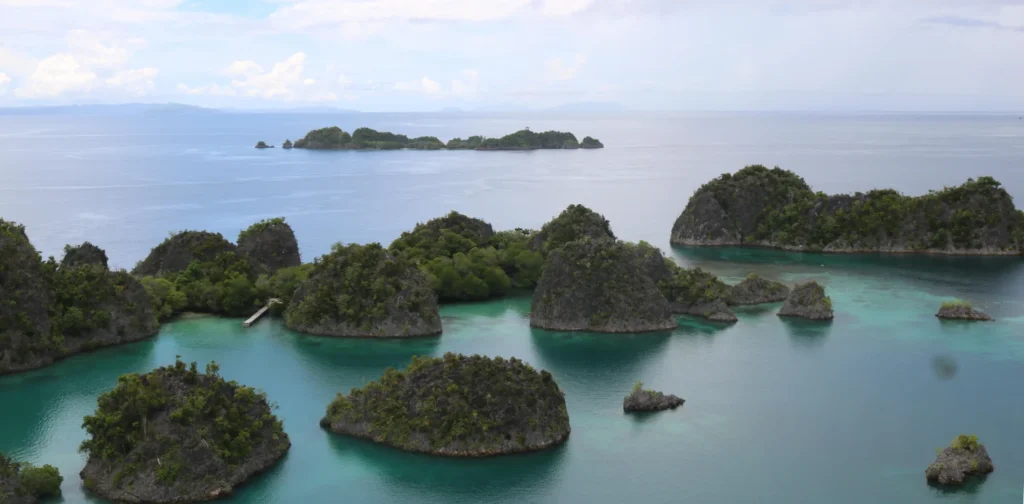Nickel Mining in Raja Ampat and the Widespread Cost of Natural Resource Exploitation

Photo: Blackinstudio07 on Pixabay.
Indonesia’s ecological richness and natural beauty are reflected in the landscape of the Raja Ampat Islands. Unfortunately, despite its status as a conservation area and a leading ecotourism destination, Raja Ampat is not free from the threat of natural resource exploitation—such as the mining of critical minerals like nickel. Beyond nickel mining in Raja Ampat, resource extraction in any location can pose serious risks to ecosystems and local communities.
Nickel Mining in Raja Ampat
Raja Ampat is known as one of the biggest centers of biodiversity in the world, with thousands of species of fish, coral reefs, other marine life, and its rich forests. Worryingly, in recent years, this natural wealth has come under threat from natural resource exploitation, particularly nickel mining.
Nickel mining activities in Raja Ampat have been going on since 1967 by Gag Nikel, which manages 13,136 hectares of land on Gag Island. The company began with exploration and continued to the production phase in 2018.
Then, in 2025, the government revoked the permits of four mining companies operating within Raja Ampat Islands: on Kawei Island, on Manyaifun Batang Pele Island, on Manuran Island, and on East Yesner Waigeo. This was done with the help of public pressure due to violations of environmental regulations and the fact that the sites were located within a Geopark area. However, Gag Nikel, a subsidiary of the state-owned enterprise Antam, continues to operate with their permit intact.
Environmental and Social Impacts
Nickel mining activities on Gag, Kawe, and Manuran Islands have had a damaging impact on Raja Ampat’s forest and marine ecosystems. The land clearing for mining activities has led to the loss of more than 500 hectares of forest and natural vegetation. This has triggered soil runoff, which worsens coastal sedimentation, damages coral reefs, and disrupts marine ecosystems. Nearby areas such as Batang Pele and Manyaifun, both close to tourist destinations, are facing similar environmental challenges.
Besides mining, Raja Ampat’s forests are also under threat from land-use changes, including plans for coconut plantations and carbon trading projects. In 2024, two companies applied for permits, but were rejected by Raja Ampat’s Indigenous communities who continue to defend and preserve their customary forests. In addition, illegal logging remains a persistent issue in the region.
Beyond environmental degradation, nickel mining in Raja Ampat and other natural resource exploitations also bring serious social impacts, especially for local communities. Mining activities can disrupt or even eliminate traditional livelihoods that rely on the health of local ecosystems and have been passed down through generations. In some cases, the presence of mining operations has also triggered horizontal conflicts within communities.
Strengthening Awareness and Concrete Action
Environmental damage, social disruptions, and even human rights violations related to natural resource exploitation are not only happening in Raja Ampat. Similar challenges are occurring in many other small islands and regions across Indonesia, including Halmahera (North Maluku), Penajam Paser Utara and Kutai Kartanegara (East Kalimantan), Morowali (Central Sulawesi), and Bantaeng (South Sulawesi).
Therefore, the widespread concern over the nickel mining in Raja Ampat should become a turning point to build stronger awareness, care, oversight, and concrete efforts to protect nature and communities, and improve natural resource governance wherever it is needed. Waiting for public outcry again is not enough.
Governments, businesses, investors, and communities must come together and commit in collaboration to mainstream more responsible economic practices and stop harmful exploitation to ensure a better future for people and the planet.
Translator: Dinda Rahmania
Editor: Abul Muamar & Nazalea Kusuma
The original version of this article is published in Indonesian at Green Network Asia – Indonesia.


 India’s Supreme Court Declared Menstrual Health and Hygiene as Fundamental Rights
India’s Supreme Court Declared Menstrual Health and Hygiene as Fundamental Rights  Impacts of E-waste Pollution on Animals and Human Health
Impacts of E-waste Pollution on Animals and Human Health  Africa’s Solar Energy Surge: Why 2025 Was a Breakthrough Year
Africa’s Solar Energy Surge: Why 2025 Was a Breakthrough Year  Agrihoods: Integrating Farms and Urban Neighborhoods into Sustainable Communities
Agrihoods: Integrating Farms and Urban Neighborhoods into Sustainable Communities  Women in Waste Management: Asia’s Circularity Runs on Women. Its Policies Still Don’t
Women in Waste Management: Asia’s Circularity Runs on Women. Its Policies Still Don’t  Embracing the Business Value of Sustainability
Embracing the Business Value of Sustainability